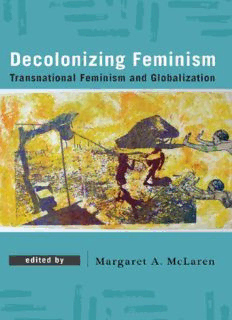
Decolonizing Feminism: Transnational Feminism and Globalization PDF
Preview Decolonizing Feminism: Transnational Feminism and Globalization
Decolonizing Feminism Decolonizing Feminism Transnational Feminism and Globalization Edited by Margaret A. McLaren London • New York Published by Rowman & Littlefield International Ltd Unit A, Whitacre Mews, 26–34 Stannary Street, London SE11 4AB www.rowmaninternational.com Rowman & Littlefield International Ltd. is an affiliate of Rowman & Littlefield 4501 Forbes Boulevard, Suite 200, Lanham, Maryland 20706, USA With additional offices in Boulder, New York, Toronto (Canada), and Plymouth (UK) www.rowman.com Selection and editorial matter © 2017 Margaret A. McLaren Copyright in individual chapters is held by the respective chapter authors. All rights reserved. No part of this book may be reproduced in any form or by any electronic or mechanical means, including information storage and retrieval systems, without written permission from the publisher, except by a reviewer who may quote passages in a review. British Library Cataloguing in Publication Data A catalogue record for this book is available from the British Library ISBN: HB 978-1-7866-0258-9 PB: 978-1-7866-0259-6 Library of Congress Cataloging-in-Publication Data Available ISBN: 978-1-78660-258-9 (cloth : alk. paper) ISBN: 978-1-78660-259-6 (pbk. : alk. paper) ISBN: 978-1-78660-260-2 (electronic) The paper used in this publication meets the minimum requirements of American National Standard for Information Sciences—Permanence of Paper for Printed Library Materials, ANSI/NISO Z39.48–1992. Printed in the United States of America Contents Preface: Toward a Decolonial Feminism for the 99 Percent Chandra Talpade Mohanty Introduction: Decolonizing Feminism Margaret A. McLaren PART 1: DECOLONIZING EPISTEMOLOGIES, METHODS, AND KNOWLEDGES 1 Decolonizing Feminist Philosophy Linda Martín Alcoff 2 Knowing without Borders and the Work of Epistemic Gathering Gaile Pohlhaus Jr. PART 2: RETHINKING RIGHTS 3 Indigenous/Campesina Embodied Knowledge, Human Rights Awards, and Lessons for Transnational Feminist Solidarity Pascha Bueno-Hansen and Sylvanna M. Falcón 4 Decolonizing Rights: Transnational Feminism and “Women’s Rights as Human Rights” Margaret A. McLaren PART 3: CITIZENSHIP AND IMMIGRATION: THE SPACE BETWEEN 5 Constitutional Patriotism and Political Membership: A Feminist Decolonization of Habermas and Benhabib Kanchana Mahadevan 6 “Home-Making” and “World-Traveling”: Decolonizing the Space-Between in Transnational Feminist Thought Celia T. Bardwell-Jones 7 The Special Plight of Women Refugees Kelly Oliver PART 4: DECOLONIZING DIALOGUE, SOLIDARITY, AND FREEDOM 8 The Dynamics of Transnational Feminist Dialogue Barbara Fultner 9 Building Transnational Feminist Solidarity Networks Sergio A. Gallegos 10 Decolonizing Feminist Freedom: Indigenous Relationalities Allison Weir Index About the Contributors Preface Chandra Talpade Mohanty Toward a Decolonial Feminism for the 99 Percent As I write this, our understandings of feminism, decolonization, and transnationalism are in flux, contested in social movements, state policy, and social and political theory. In 2010, Jacqui Alexander and I wrote about the use of the transnational as a normativizing gesture in neoliberal times.1 We asked then what a radical, counterhegemonic, transnational/decolonial feminism might look like. My questions are not substantially different seven years later, although the explicit exercise of power is more visible at this historical moment. In 2017, the transnational necessitates acknowledging explicitly carceral regimes; geopolitical climate destruction; militarized national borders; massive displacement of peoples (war, climate, and economic refugees); proliferation of corporatist, racist, misogynist cultures; lean-in and glass ceiling (liberal) feminisms; the decimation of labor movements, and the rise of right-wing, proto- fascist governments around the world (Modi in India, Erdovan in Turkey, Trump in the United States). An important moment then for a book on Decolonizing Feminism, especially one that offers original, nuanced, and visionary feminist analysis that crosses epistemological and disciplinary borders and provides conceptual tools to decolonize hegemonic feminisms and fracture the transnational as a normativizing gesture. Organized around the central question of what it would mean to “decolonize transnational feminism” in the age of neoliberalism, feminist philosophers, and social theorists take up core transnational feminist concerns in deeply thoughtful and provocative analyses of human rights, citizenship and immigration, and dialogue/solidarities in the quest for justice and freedom. The volume consists of ten smart and provocative chapters organized around four central themes: Decolonizing Epistemologies, Methods, and Knowledges; Rethinking Rights; Citizenship and Immigration: The Space- Between; and Decolonizing Dialogue, Solidarity, and Freedom. Margaret A. McLaren in her Introduction to the volume describes the questions at the core of the project: “What does it mean to decolonize feminism? How do the frameworks/approaches of decoloniality and feminism inform, enhance, contradict, and mutually influence one another? How can decolonial approaches to feminism help to navigate twenty-first-century concerns of the increasing influence of global capital and transnational corporations, repressive state forces, nationalism, xenophobia, the forced displacement of peoples and immigration, the increasing gap between the wealthy and the poor within nations, the increasing global wealth gap between nations of the global North and the global South, and the looming environmental crisis?” These are urgent and important political and intellectual questions at this time when the rhetoric of “transnational” has been co-opted on a large scale in neoliberal university settings. Administrators are “transnational” since they travel across the globe in search of profitable partnerships with universities in other countries, and for “international” students who can pay for higher education that is no longer available to working-class and poor students in the United States. Academic curricula are also “transnational” since “study abroad” programs now buttress a normative curriculum that supposedly prepares students to compete in a global market. In the U.S. academy “transnational” often becomes a placeholder for business as usual, marked as “progressive” in the face of a conservative, xenophobic backlash. Globalization and transnational knowledge production becomes the new managerial mantra in neoliberal universities. In addition, the larger geopolitical landscape poses urgent and significant challenges to those of us committed to an anti-capitalist, anti-imperialist, decolonial feminist praxis. While the old/new, constantly shifting political terrain of Trump and company suggests the consolidation of a white
Description: